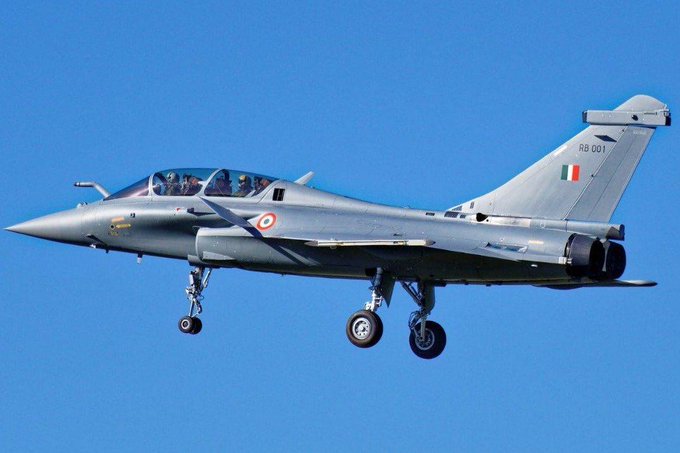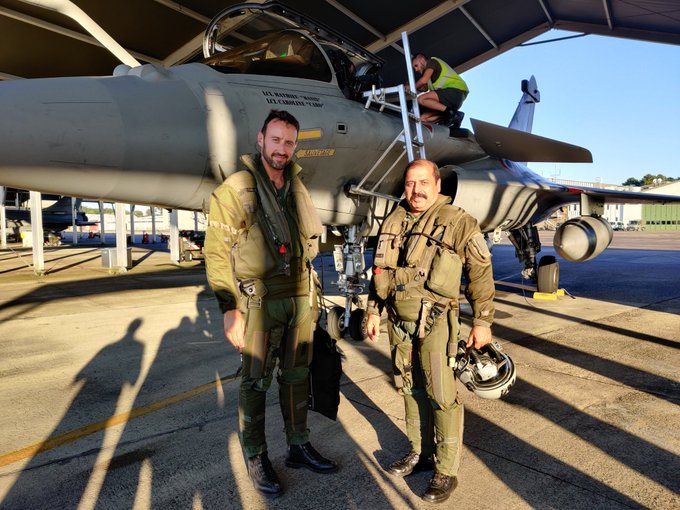
With the first Rafale ‘handed over’ to the Indian Air Force on September 19 in France, proceedings have officially begun towards the commissioning of four jets into Indian service on October 8 at Merignac with India’s defence minister Rajnath Singh in attendance. The first jets in Indian hands also clear decks for something bigger that’s remained in suspended animation for months through India’s stormy election season — a follow-on order for 36 more Rafales for a total of 72 aircraft. It remains unclear when the Narendra Modi government will pull the trigger on a second deal, though there are strong indications that the groundwork has been laid.
The first Indian Rafales will arrive in India in April-May next year and populate their inaugural squadron, 17 Squadron ‘Golden Arrows’ in Ambala, Haryana. A second squadron will come up in Hasimara in India’s east. Indian Rafale pilots being trained in France have received several operational briefings on current Rafale operations in Iraq and Syria. On a visit to the French Navy’s Landivisiau air base in 2017, Livefist also received an overview of the Rafale in combat operations.

In a surprise move being interpreted as support for the Rafale deal, the Modi Government this week named IAF vice chief Air Marshal Rakesh Bhadauria the next Chief of the Air Staff from the day he is slated to retire. As Deputy Chief, Bhadauria had led crucial negotiations with Dassault on the pricing and package that was finally signed. The IAF’s next man at the helm is, therefore, one who has witnessed every twist and turn of the deal from ringside and can, with the authority of his highest office, now see any follow-on deal for Rafales through. The ‘RB’ on the Indian Rafale tail numbers, incidentally, stand for ‘Rakesh Bhadauria’.
The first major indications that the Modi Government was prepared to power through with the Rafale deal despite an aggressive and unrelenting political controversy over the original 2016 deal came in March this year when Prime Minister Narendra Modi, speaking at the India Today Conclave, said the outcome of the post-Balakot air confrontation involving Wing Commander Abhinandan Varthaman would have been different if the IAF was using Rafales.
A second deal appeared afoot in March 2018 when the French government officially request the Indian MoD to reveal that the two countries were in discussions to conclude a deal for an additional 36 Rafale jets. All possibility of this quickly evaporated with the opposition Congress Party escalating its campaign against the 2016 Rafale deal and alleging corruption and cronyism. With the dust settling on the Rafale narrative following a massive election victory for the ruling Narendra Modi government — and the political potency of the Congress campaign proving a non-starter — the political legroom to revive intentions to add 36 Rafales to the order has increased. It is now known that that the Emmanuel Macron government in August officially refreshed its offer of 36 more Rafales to India on terms that take into account India’s ‘one-time’ investment component in the country-specific enhancements and infrastructure to support the aircraft in Ambala and Hasimara.
A national audit report on the Rafale deal is expected later this year, and could add to the harsh observations it had on the selection process — something that taints the Congress-led UPA government equally, if not more. That said, the path to any deal isn’t politically risk-free, and it is unlikely that the government will lose sight of how delicate the next steps will need to be if it intends to close a deal for 36 more Rafales. While it is true that the Rafale controversy proved a complete dud politically, it will be unlike the Modi Government to overplay its hand. For now, an offer is on the table, and the path to that table stands clear of any prominent hurdles.
Beyond the IAF, the Rafale is also in contention for the Indian Navy’s carrier-borne fighter requirement for 57 aircraft. The Rafale prospectively goes up against Boeing’s F/A-18 Super Hornet for this contest. The navy’s contest is unlikely to make forward movement before the end of next year.

The rafale is the best choice for the iaf and in. Hope India never buys fighters or serious offensive equipment from the Americans and brits, coz you never know when sanctions will come our way. It’s only the french and Russians who have stood on our side in good and bad times. They are better partners to make defense deals with.
You can’t fight a war with imported tech. Develop indigenous capabilities. No point spending billions of tax payer money on french planes who charge their weight in gold. Beg borrow or steal and develop the in-house skils and export better weapons back to french.
The Eurofighter is a no go from the get go. Germans already vetoed German equipment supply for a British sale to Saudi Arabia. It is not England I would worry about but these convoluted Euro projects and sales that require uninamity in agreement from multiple parties.
They neet to import pilots not jets. Bitter truth.
Often indian heros are those which are fucked by the world like sunny leon, abhi nandan…
The breakup of 28 +8 was kind of already hinting at this no?
French seem to be looting India. If Belgium can get 34 F-35 for 4.34 Bill US $ Then why pay more for 36 Rafale
Yeah, the extra money was paid to get engine technology but they cheated us. Our poor tax payers pay inflated prices for these gold plated weapons, so unfair. Stop imports.
The french is more costly because the support infrastructure for the Belgian F35 is already pretty much paid for in terms of Lockheed already supplying vested neighbors. No, the danger with the F35 is that Turkey was booted out and now they are scrambling for new parts suppliers for the F35 from other participating nations. The Rafale will prove cheaper in the long run despite its higher initial costs of the support structure being shared by fewer buyers. India could in fact milk the French of the Rafale’s technology transfer because it is a European exception that embarasses Macron. He wants to get rid of it, and I surmise French engineers and know how working on the project might very well agree to relocate to India if they do not like the Euro-wide condition agreement of work, losing seniority to German engineers taking control of the next Euro stealth fighter program.
you sir have the brain of a small rodent. congratulations!